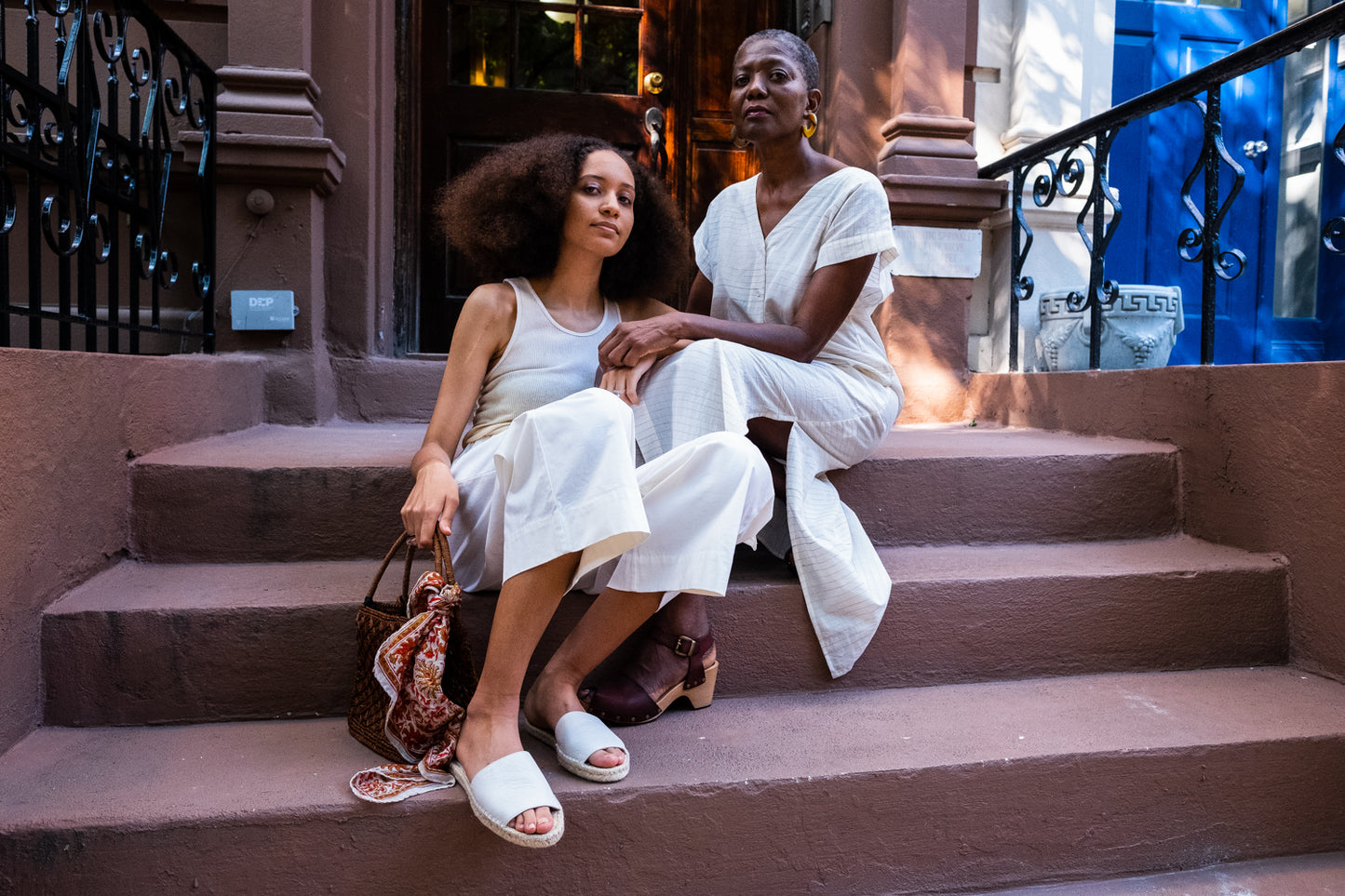On a recent, summer Sunday, we donned our masks and visited the beautiful Harlem home of a United Nations staff member who supports the work of the Economic and Social Council, Leslie Wade and her filmmaker daughter, Janneke.
We were not the only ones grateful to be let in from the humidity, as a few unwelcome flying guests came in the door behind us and buzzed around the orchid flowers for the rest of our stay. “I’ll have to do something to offset my carbon emissions,” Leslie smiled, referencing the room’s cool air.
With a bowl of fresh mango in hand, we socially distanced ourselves on the couch next to a copy of James Baldwin: Early Novels and Stories. The following is the conversation we shared about working for stability around the world, protesting as a UN staff member, sustainable fashion and how to say Grandma in Dutch.
M.PATMOS: How are you ladies doing? How have you been keeping your sanity during this time, what have you been up to?
Janneke: You’ve been cooking more...
Leslie: Yes, yes. I hated cooking before but now, it’s really incredible; I enjoy it. I do it almost everyday. I’ve been trying different recipes, nothing crazy or anything because my days are still quite busy.
Janneke: We play Scrabble and I introduced her to America’s Next Top Model — we’ve been binge watching it.
Leslie: And walking much more in Central Park around the reservoir.
M.PATMOS: How long have you lived in New York?
Leslie: So, I’ve been in New York about twenty-five years. When I arrived I lived in Harlem for three years and then I moved to Brooklyn.
Janneke: When I was born.
Leslie: I took Janneke from the hospital — Lenox Hill — and moved that day to Brooklyn in the same house as Marcia (Patmos). That’s how we met.
Janneke: The origin story!
Leslie: But, I actually came to New York for the very first time in 1981 — ooh, that’s so long ago. And I attended Long Island University, the campus in Brooklyn, because they offered a United Nations Studies graduate certificate program. I had always wanted to work at the UN, so I thought that would be helpful.
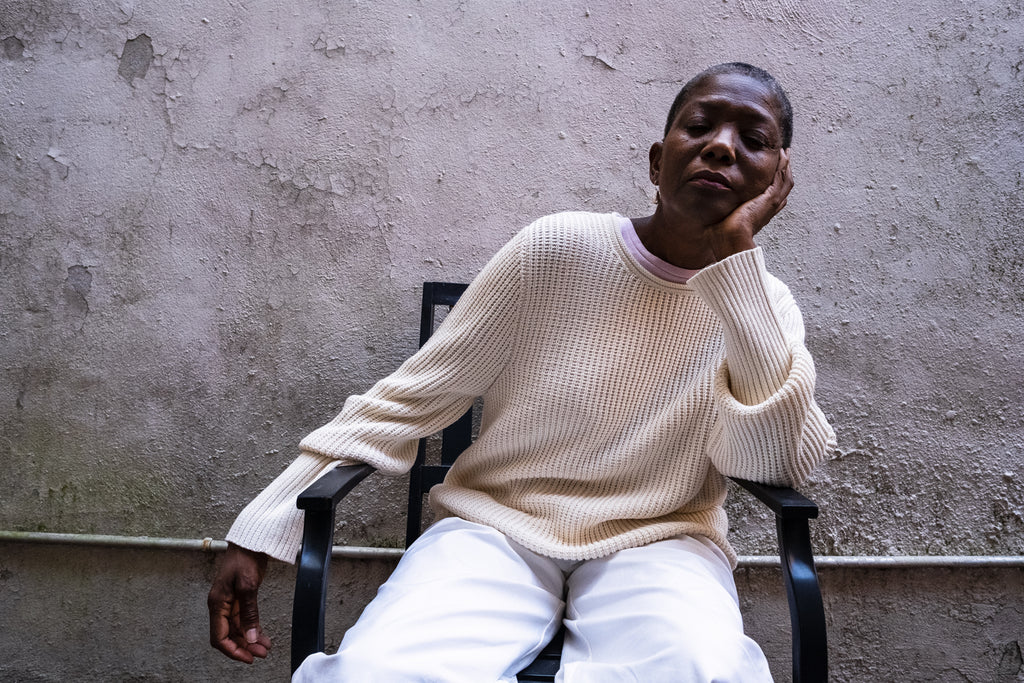
M.PATMOS: And where were you coming from prior to that? Where did you grow up?
Leslie: So, I grew up in Nevis, a very tiny island called Nevis. Most people, most Americans, have never heard of it. I am proud to tell them that it was the island where Alexander Hamilton was born.
M.PATMOS: Is that true?
Leslie: It’s true! That’s one of the things we’re famous for, or not so famous because hardly anybody knows. So, I went to high school on my island and did my first degree at the college of the Virgin Islands before I came to New York. After the UN Studies course, I moved on to Howard University in Washington, D.C. and got a master’s degree and started work towards a PhD. In the meantime, my country became independent in 1983 and I discovered there was the opportunity for folks from Saint Kitts and Nevis to be able to work at the UN.
M.PATMOS: Would you mind sharing with us a little about your career?
Leslie: Yes so, I did manage to join the UN in 1985. My first duty station was in Chile, Santiago de Chile, and I worked there for a couple of years mostly on issues related to international trade. From there I went to the sub-regional headquarters based in Trinidad for the Economic Commission for Latin America and the Caribbean, there is one of these commissions in every region — one in Africa, in Asia Pacific, in Europe, etc. My background is in economics and political science and so my first posts related more to economic development. But then I was able to experience the political and security part of the UN.
M.PATMOS: In what way?
Leslie: I took advantage of going to Namibia. Namibia was, how should I call it… a territory of South Africa when South Africa was still under Apartheid. The UN had been trying to bring independence to Namibia — there was a guerilla movement, an independence movement for many years. So, my first trip to Africa was a part of that mission to bring independence to the country. I spent nine months and was there for independence on March 21, 1990. For me the most thrilling, the most meaningful part of my UN career was to do that mission. You felt like you were part of something huge. It was a mission that was welcomed by everyone and there was a clear case of good versus bad. The South African government respected the authority and neutrality of the UN and so it was a relatively safe mission. But in Cambodia, just a few years later, where I spent fourteen months as part of the civil administration transitioning the country from that period of genocide, it became a bit dangerous. There were kidnapped UN staff members and a few died. While it could feel like you were doing something important for the average Khmer people, at the same time it was very hard to work with the folks who held power.
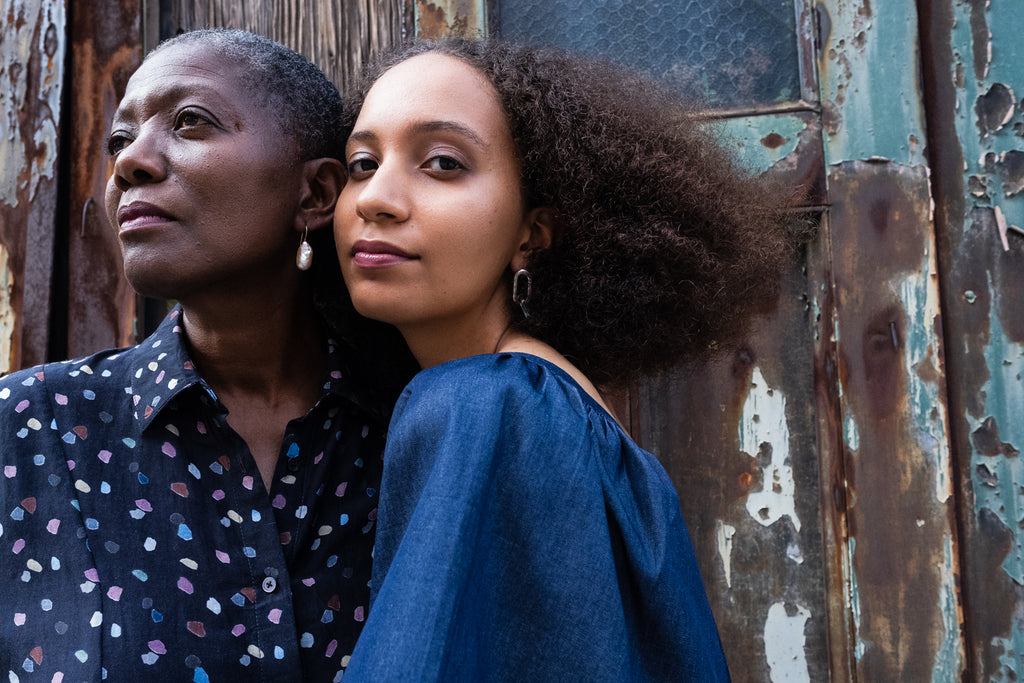
M.PATMOS: Given all of those very difficult situations that you observed and circumstances that you worked within, it must give you a unique perspective on our situation in America these days. Did you participate in any of the recent protests?
Leslie: Yes, of course. For the UN, it’s a bit tricky because of the need for the UN to be perceived as neutral. Generally we are prohibited from having a view about things that happen in each individual country; it is particularly sensitive because the U.S. is the host country. Initially when the protests started, we were told not to participate. But there was a groundswell from staff because, you know, this is what the UN stands for: equality at the most basic level and respect for human rights. And it turns out that one of the most famous African Americans who was part of the UN’s Civil Service, someone by the name of Ralph Bunche, an Under-Secretary-General, actually participated in the march on the Edmund Pettus Bridge. There is a photo of him with Martin Luther King, Jr. Staff members brought that up and we were allowed to participate. And so, we did.
M.PATMOS: Janneke, how was the experience of the protest for you?
Janneke: It was definitely one of the highlights of my summer. It was close to our apartment in the park and there was a concert there with mostly Black singers performing. I had actually never really heard about Juneteenth until the Black Lives Matter movement came into the forefront after George Floyd’s murder. So to celebrate African Americans’ freedom was something very special to me.
M.PATMOS: What year of school is coming up for you?
Janneke: I’m still in college, I have one more year until I’m done so I’m a rising Senior. I’m glad that I only have one year left, especially since it’s turning into more of an online education.
M.PATMOS: What school are you attending?
Janneke: Loyola Marymount University in Los Angeles, studying film production.
M.PATMOS: That’s fun. What are the areas of interest you’d like to pursue in film?
Janneke: At first, I really wanted to be a showrunner for a sitcom, but now, after doing more volunteer work, I’m thinking of doing documentary films. I actually made a documentary recently in Holland — I interviewed my grandmother about her experiences during World War II and I did that during the month of March when the pandemic became more of a serious thing, so that was pretty stressful. I didn’t have my crew with me because they were worried about being quarantined in Holland. So, I mostly shot the film by myself except for a family friend who helped me with camera movements; it was a good learning experience.
M.PATMOS: What was it called?
Janneke: Oma Miep Remembers. ‘Oma’ means Grandma in Dutch and her name is Miep so that’s how the name came about. I submitted it to a couple of film festivals and it won the Best Historical Short Film category in a festival in London and then it was also selected at the Amsterdam World International Film Festival. I’m also thinking about making a film on black street art and how it can be used as a message to get more people involved — like the Black Lives Matter murals and the Know Your Rights mural on racial profiling that is a couple of blocks from here.
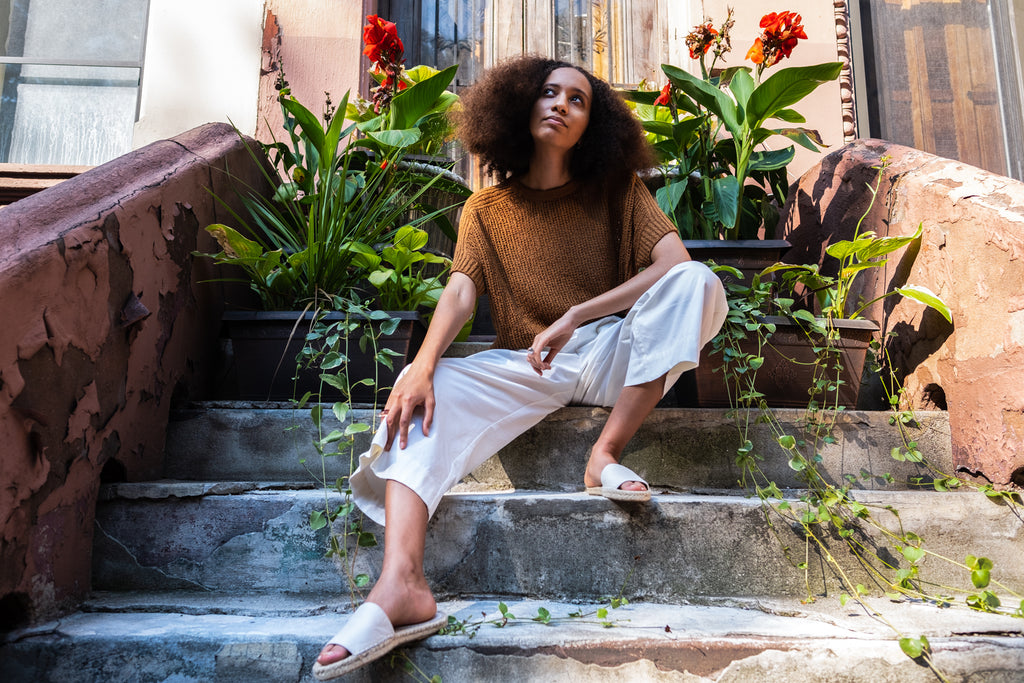
M.PATMOS: Leslie, you’ve been a long time client of M.PATMOS, what is it that keeps you coming back?
Leslie: The style of the clothes, the effort that is made to use fabrics that are quite sustainable and support local craftsmen. And also the support for indigenous people, to keep their craft going while making sure that they are properly rewarded. Doing that keeps alive very important traditions and the culture of those folks. I want to contribute in my small way to make sure that I kind of walk the talk. Even in my own personal life, I want my values to be consistent with the values of the United Nations.
M.PATMOS: Speaking of sustainability, how involved are you with the UN’s Sustainable Development Goals?
Leslie: Actually our office supports the High Level Political Forum, a platform within the United Nations that brings together all member states and a variety of stakeholders from the private sector and NGOs, every year to assess the implementation of the 2030 Agenda — the broader agenda under which the seventeen Sustainable Development Goals fall. As a matter of fact, essentially this is more or less what my work is all about now. We just concluded the forum in mid-July that had been discussing progress towards achieving the Sustainable Development Goals. COVID is going to have a huge negative impact, but the ‘Goals’ are the roadmap to building resilience and so the more we try to reach them, the stronger countries and groups of people will be when the next pandemic hits.
M.PATMOS: Many industries are of course global now, operating under different governments, and seem to have more power than many of the governments do. Is there an effort to work with certain industries, like the fashion industry, to mitigate negative impacts on the ‘Goals’?
Leslie: Yes, absolutely, there is something called the Global Compact put in place by the late Secretary-General, Kofi Annan, in 2000, which was intended to bring on board the private sector to try to sell them on the precursor of the Sustainable Development Goals, the Millenium Development Goals. Separate from the Global Compact, the various organizations of the UN are working quite closely with private sector companies. There was a small program on sustainability in the fashion industry, we certainly had a discussion about this a couple of years ago and a lot of it is really about supply chains and making sure that those supply chains respect the input of folks who are not normally considered when people are making decisions — the textile makers and so on.
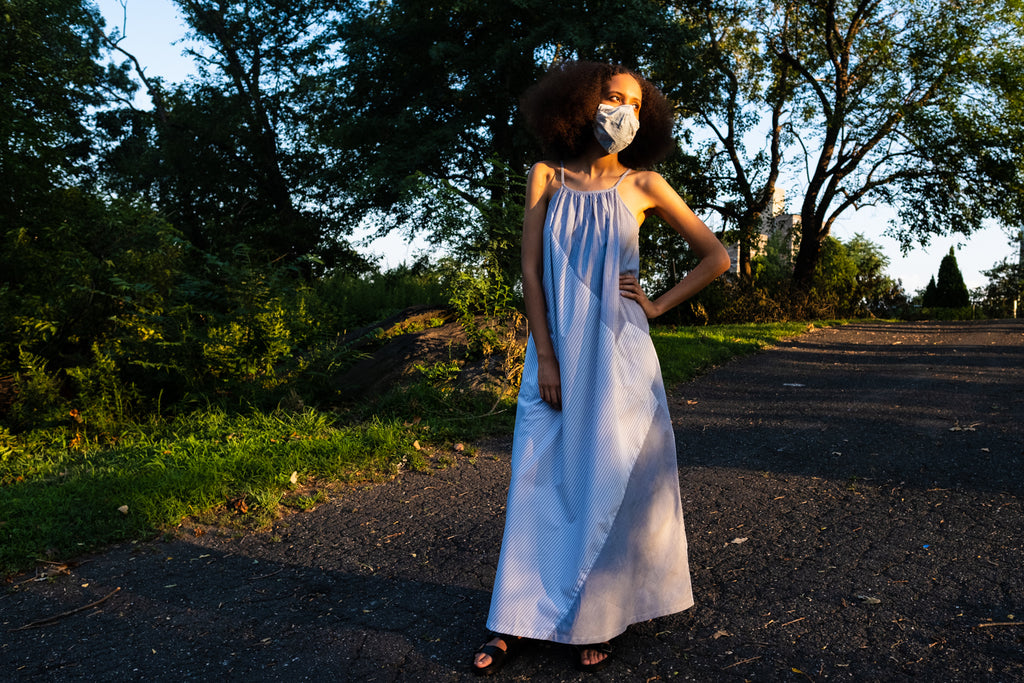
M.PATMOS: How might the United Nations reach more young people to learn about the Sustainable Development Goals and to help prevent climate change and future pandemics?
Leslie: The Economic and Social Council actually began what is called the ECOSOC Youth Forum to discuss precisely the Sustainable Development Goals and to try to draw from the vision the ideas of young people to help shape some of the policy recommendations that the Council makes to governments. The way that you reach people, we think, is through the tech savvy folks that are very good at communications. It really has to be a whole of society approach.
M.PATMOS: Janneke, does someone at your age have any interest in sustainable fashion? What are your style preferences lately?
Janneke: It’s not on my mind right now but, I definitely need to think more about that. I like something casual but still a little hip. Something that’s bold, something that’s different. I like patterns.
— Sometimes you’ll help me shop.
Leslie: Yes, that’s one of the wonderful things about having a girl, I really love shopping for her. I tried to make her style of clothes similar to my style, but around age twelve she started rebelling.
Janneke: You like to wear more African prints, right?
Leslie: Yes, for just bumming around the house or in the neighborhood.
M.PATMOS: Do you think people will want to get dressed up anymore?
Janneke: I think people will, for like, an Instagram post.
Leslie: Oh, just for that?
Janneke: Yeah, just for Instagram
~
This interview has been edited and condensed for content. Photography and interview conducted by Jennifer Mason




















































